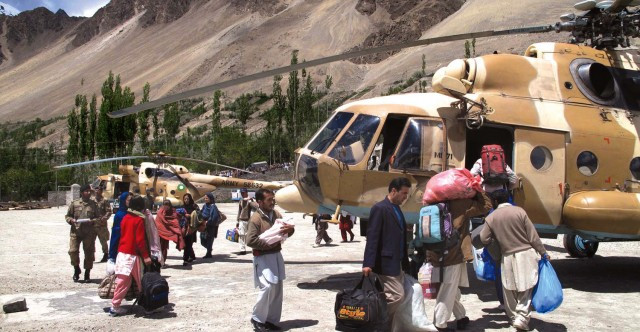Helicopter services resume as water-level tops 350 feet

Helicopter services were resumed because local authorities had decided to discontinue ferrying people across the water by boat given that the lake’s waterlevel had surged tremendously, to a depth of 355 feet. “It wouldn’t be wise to continue the boat service in such a situation,” an official said, alluding to the fact that the lake threatens to burst its banks within days. People stranded in Gulmit and other parts of Gojal were lifted to their destinations on Thursday, officials said, adding at least two army helicopters took part in the relief effort.
In order to restore the severed link between Gojal, Gilgit, and other areas the government had launched a boat service more than three months ago. Exact figures determining how many people used the helicopter service on Thursday were not available, but officials in Hunza and Gojal said that many residents were still waiting to be flown to their destinations. More than 36 villages downstream have been declared vulnerable to the disaster and officials said that people have been shifted away from those villages to safer places.
Officials have said that the inflow recorded at the lake was more than 4 feet per day. They also said that the sum total of water in the lake amounted to 0.3 million acre feet on Thursday. The disaster has also badly affected road links through out the area. Federal Minister for Kashmir Affairs and Gilgit-Baltistan Manzoor Ahmed Watto said that approximately 22 kilometres of the Silk-Route had been inundated by water from the Attabad Lake. He said that the damaged portion of the Silk-Route would be re-constructed on a priority basis when the water is flushed out of the lake. The Minister said the Tarbela Dam would not be affected by water flowing out of the Attabad Lake.
Meanwhile, aid has been making its way into the affected region. The Pakistan Red Crescent Society (PRCS) sent 2,500 Non-Food Item (NFI) kits for the Hunza landslide victims on the National Disaster and Management Authority’s (NDMA) request. One NFI kit includes a tent, a blanket, a jerry can, a tarpaulin sheet, one stove, a hygiene kit and other items. The NDMA had also requested that a medical team be sent to the affected villages and the PRCS deployed a medical team to the area.
The PRCS has also moved a water filtration plant to Hunza. The plant can filter up to 600,000 litres of water per day. The Pakistan Red Crescent Society said it is capable of providing full relief and medical cover to 35,000 families in case of any disaster at a national level, and the society’s provincial branches have a capable of providing for 25,000 families each.
The Managing Director of the Pakistan Baitul Maal (PBM) Zamrud Khan visited the region on Thursday and said that about 50 trucks of aid items will reach Gilgit by Friday.”I am the representative of the federal government and I want to congratulate the local government for what it is doing for the IDPs,” he said. Wattoo said the prime minister had given about Rs 800 million to the Gilgit-Baltistan government as aid for the IDPs.
Published in the Express Tribune, May 21st, 2010.



















COMMENTS
Comments are moderated and generally will be posted if they are on-topic and not abusive.
For more information, please see our Comments FAQ